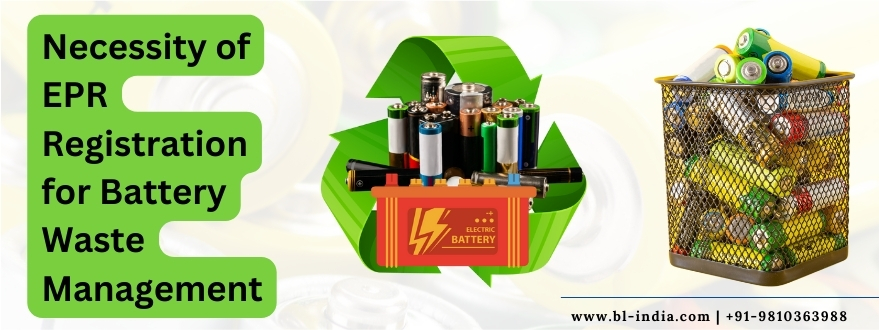
As technology continues to advance, the use of batteries has become ubiquitous, powering everything from our smartphones to electric vehicles. However, with this widespread use comes the challenge of disposing of batteries responsibly to mitigate environmental hazards.
With the exponential growth in electronic devices and renewable energy technologies, the responsible management of battery waste has become imperative to mitigate environmental risks and ensure public health safety.
In India, the concept of Extended Producer Responsibility (EPR) has been introduced as a mechanism to hold producers accountable for the end-of-life management of their products, including batteries.
Let's delve into the requirements of EPR Registration for battery waste in India and its significance in sustainable waste management.
EPR Registration for battery waste management is a critical component of India's efforts to address the environmental and health challenges associated with battery disposal. It mandates producers, importers, assemblers, and re-conditioners to take responsibility for the entire lifecycle of batteries, from production to end-of-life disposal.
By establishing collection mechanisms and promoting environmentally sustainable recycling practices, EPR Registration ensures that battery waste is managed in a responsible manner, minimizing its adverse impact on the environment and public health.
The Battery Waste Management Rules provide the regulatory framework for implementing EPR obligations, outlining specific requirements for the collection, recycling, and disposal of different types of batteries.
Compliance with these rules is essential to achieve effective battery waste management and foster a sustainable approach towards resource conservation and environmental protection.
The Battery Waste Management Rules of 2022 highlight several key points regarding Extended Producer Responsibility:
Note: In case of failure to meet the obligations and EPR targets, environmental compensation will be imposed, aligning with the Polluter Pay Principle and emphasizing accountability for environmental impact.
The Battery Waste Management Rules are applicable to entities engaged in various aspects of handling waste batteries, encompassing collection, segregation, transportation, refurbishment, and recycling. Specifically:
Note: Exemptions are provided for batteries utilized in equipment associated with essential security interests, such as arms, ammunition, and military-specific applications, as well as those designated for space launch purposes.
EPR Certificate for battery waste is mandatory in India to ensure responsible management and minimize the environmental and health hazards associated with battery disposal.
These rules under EPR include all varieties of batteries and are categorized into four primary groups:
Automotive Battery:
This category includes batteries solely intended for automotive applications such as starter, lighting, or ignition power.
Electrical Vehicle Battery:
This refers to batteries specifically engineered to provide traction for hybrid and electric vehicles during road transport.
Industrial Battery:
This classification comprises batteries designed for industrial purposes, excluding portable, electrical vehicle, and automotive batteries. Examples include sealed batteries (excluding portable ones), unsealed batteries (excluding automotive batteries), and energy storage system batteries.
Portable Battery:
Describes batteries that are sealed, weigh less than five kilograms, and are not intended for industrial use, electric vehicles, or automotive battery applications.
The requisites of EPR Registration for battery waste impose the following conditions on registered producers/manufacturers:
Note: If any registered producer/manufacturer on the online portal is found to have provided false information, willfully concealed information, or deviated from the conditions stipulated during registration under the BWM Rules, 2022, their registration may be revoked for a one-year period after providing an opportunity to be heard. Entities whose registration has been revoked will be ineligible to register afresh for the duration of the revocation under EPR Registration for battery waste management.
The procedure to obtain EPR Certificate for battery waste involves the following steps:
Step 1: Gather all necessary documents and information required for the EPR Registration application.
Step 2: Complete the application form as per the prescribed format and submit it along with the required documents to the regulatory authority responsible for managing battery waste, such as the Central Pollution Control Board in India.
Step 3: The regulatory authority will assess the submitted application and verify the provided information to ensure compliance with EPR requirements and regulations.
Step 4: Upon successful assessment and verification, the CPCB will evaluate the application and issue the EPR Registration Certificate to the applicant.
Key documents required for EPR Certificate for battery waste include:
As the demand for battery-powered devices continues to rise, ensuring responsible disposal and recycling of battery waste becomes paramount.
For manufacturers seeking EPR Registration for battery waste, partnering with a reliable and efficient company, Brand Liaison, can streamline the process, making it easier and quicker to obtain the necessary certificate.
By providing comprehensive assistance and support, we enable manufacturers to fulfil their EPR obligations efficiently while contributing to a cleaner and healthier environment.
Contact us today to follow the specified principles of Extended Producer Responsibility and work towards a greener and more sustainable future for India!